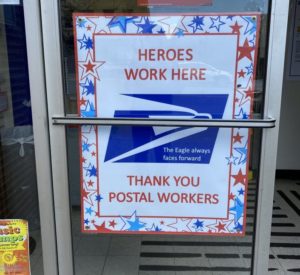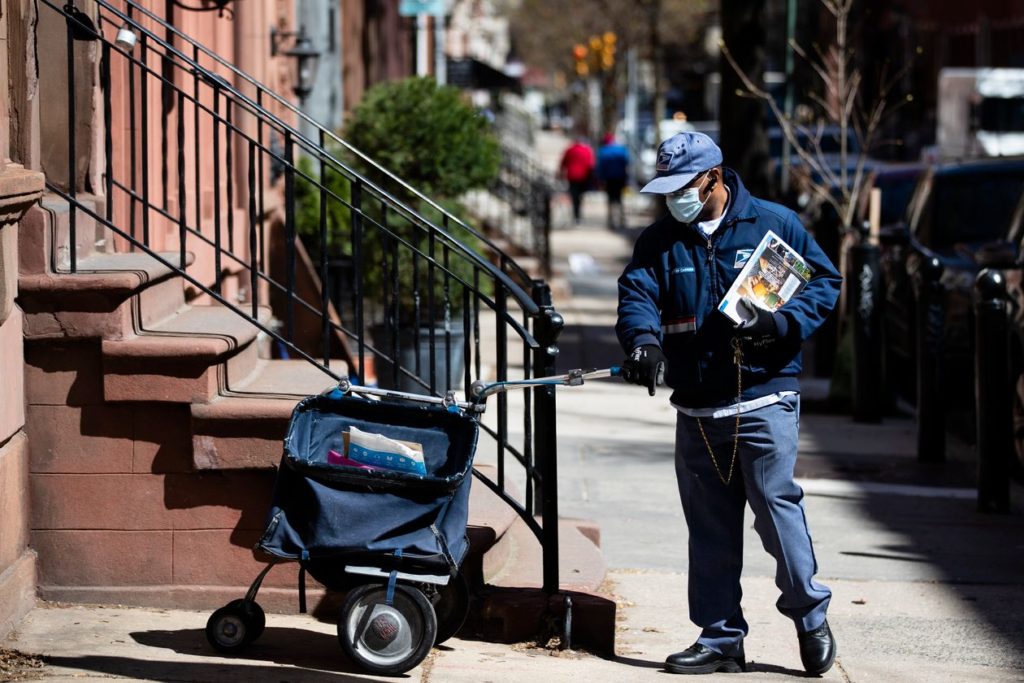Overworked Postal Service Workers Face Disease and Job Losses; 3,800 Sick, 25,000 Quarantined
Donald Trump calls U.S. Postal Service workers “great” as he actively tries to tank the 225-year-old institution. Mail handler Dwight Burnside and co-workers don’t believe the president thinks much of them at all.
“Most of the people on the floor just don’t feel appreciated,” said Burnside. He works at the Merrifield (Va.) Processing and Distribution Center. “They just don’t feel like the current administration genuinely understands what we’re doing and how important the work that we’re doing is to the country.”
The COVID-19 pandemic has killed more than 60 Postal Service workers nationwide. Some 3,800 Postal Service workers have either tested positive or shown signs of the coronavirus. Since January about 25,000 Postal Service workers have been quarantined.
Having so many workers out sick or in isolation has added to the stress on those still working and worrying when they will become infected.

Having so many workers out sick or in isolation has added to the stress on those still working and worrying when they will become infected.
The workload has become punishing in Merrifield, where many workers are in their 40s or 50s, and some even older, staffing is down to 74%.
Loss of Job or Life
Burnside, who is president of the local branch of the mail handlers union, has been at the job for 31 years. With the dual threat of potentially losing both his life and job, he isn’t feeling “great” at all. On the contrary, he says he feels slighted, overlooked and ignored.
“We hear all the time about how the police and the fire department and the first responders and what they’re doing—but you very rarely hear any credit being given to the Postal Service workers,” Burnside said. “Leaving families at home and really putting their lives on the line to come to work to get the mail out even though we’re under this pandemic.”
Read DCReport’s Erik Sherman on how Trump and the Radical Republicans are gutting the Postal Service and trying to hand it over to their corporate cronies.
Kim Smith works out of the Morgan Post Office on Ninth Avenue in New York City. At 51, she’s devoted half her life to the U.S. Postal Service. She said working throughout the COVID-19 pandemic is hard because “you don’t know where it is” or “who has it” because people working at your side can be asymptomatic.
“We lost a lot of members, some of whom I’ve known and some I didn’t,” Smith said. “But they’re brothers and sisters in this union. It’s like losing a distant cousin.”
Trump’s Callous Treatment
 As bad as that’s all been, Smith says the hardest part of the pandemic is the Trump administration’s callous and ungrateful treatment of essential frontline Postal Service workers like her.
As bad as that’s all been, Smith says the hardest part of the pandemic is the Trump administration’s callous and ungrateful treatment of essential frontline Postal Service workers like her.
“To know that we have a president that is just anti-Postal right now is even scarier than the virus itself,” Smith said. “You can protect yourself from the virus—wear a mask, use sanitizer and wash your hands. When you have a president and a government that is just not trying to work with you as far as assisting with funding—that’s the scary part.”
Union leaders representing letter carriers and mail handlers across the country believe that without the direct appropriations pending before the U.S. Senate, the postal service could run out of money by the fall.
“We’ve faced our challenges, but these people have heroically continued to deliver for the customers they serve at a time when it’s been more important than ever before,” Brian Renfroe, executive vice president of the National Association of Letter Carriers told reporters this week.
When the pandemic began, 55-year-old Jimmy Donohoe found himself power washing letter carrier satchels and delivering the mail himself. His official job at downtown Boston’s Carrier Annex next to Fenway Park is to sort the parcels and flats, as letters are known to postal workers.
Money for Cruise Lines
“It really bothers me that the Trump administration or the Republicans — I don’t know who you want to blame, but we’ll go with Trump because he’s the one who said the post office was a joke — won’t help out an American institution, but they’ve given money to cruise ships who fly under the flag of a foreign country so they don’t have to pay taxes,” Donohoe said. “That bothers me.”
Potentially infecting the people in his life with coronavirus also weighs heavily on Donohoe.
“I don’t go to see my father,” Donohoe said. “I don’t go to see my friend who has M.S. And my friends are like, ‘why?’ And I’m like, ‘because I am out and about — I could infect you.’ And then they’ll think about it and say, ‘yeah, you’re right. In that respect, quite frankly, it kind of sucks’.”
Four of the 16 letter carriers assigned to the Boston Annex have not been back to work since March — after learning one of their colleagues tested positive for COVID-19.
“Four carriers have not been back to work since St. Patrick’s Day because they have elderly parents and childcare issues,” Donohoe says.
12 to 14 Hour Workdays
For those who carry on, that means working 12- to 14-hour days and being cooped up at home the rest of the time. It’s tough.
“It’s frustrating,” Donohoe says. “But that’s why I’m working so much — I don’t have anything else to do. I can’t go to the Elks, I can’t go out to a movie, we can’t go out to dinner — you can’t do anything.”
Pulling extra hours at work does mean more money, but Donohoe still worries about what the immediate future holds for him and his co-workers.
“Right now, I’m making extra money — but we’ll see what happens,” he says. “We just got a new post master who’s anti-labor, anti-everything — even the anti-Christ of labor. So, we’ll see how this works out.”
Featured image: Matt Rourke/AP





